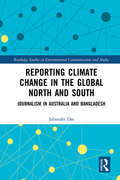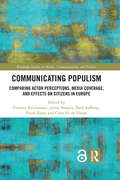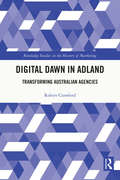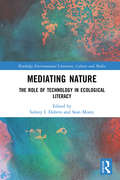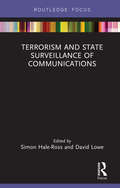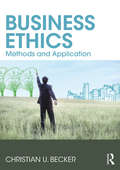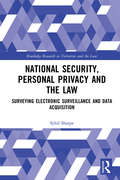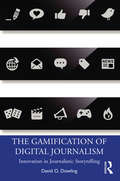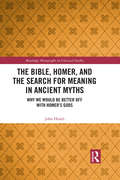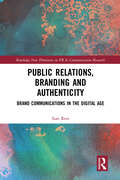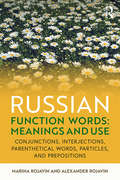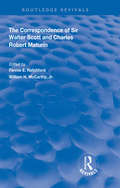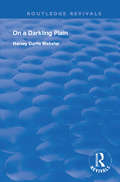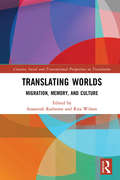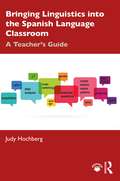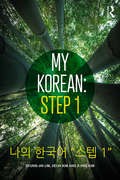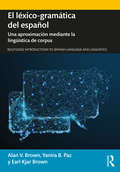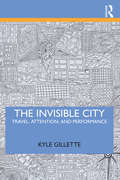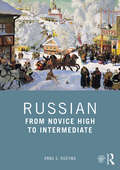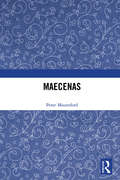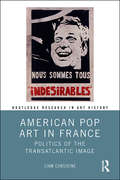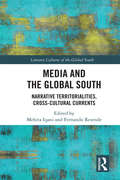- Table View
- List View
Reporting Climate Change in the Global North and South: Journalism in Australia and Bangladesh (Routledge Studies in Environmental Communication and Media)
by Jahnnabi DasThis book reveals how journalists in the Global North and Global South mediate climate change by examining journalism and reporting in Australia and Bangladesh. This dual analysis presents a unique opportunity to examine the impacts of media and communication in two contrasting countries (in terms of economy, income and population size) which both face serious climate change challenges. In reporting on these challenges, journalism as a political, institutional, and cultural practice has a significant role to play. It is influential in building public knowledge and contributes to knowledge production and dialogue, however, the question of who gets to speak and who doesn’t, is a significant determinant of journalists’ capacity to establish authority and assign cultural meaning to realities. By measuring the visibility from presences and absences, the book explores the extent to which the influences are similar or different in the two countries, contrasting how journalists’ communication power conditions public thought on climate change. The investigation of climate communication across the North-South divide is especially urgent given the global commitment to reduce greenhouse gas emissions and it is critical we gain a fuller understanding of the dynamics of climate communication in low-emitting, low-income countries as much as in the high emitters, high-income countries. This book contributes to this understanding and highlights the value of a dual analysis in being ably draw out parallels, as well as divergences, which will directly assist in developing cross-national strategies to help address the mounting challenge of climate change. This book will be of great interest to students and scholars of climate change and environmental journalism, as well as media and communication studies more broadly.
Communicating Populism: Comparing Actor Perceptions, Media Coverage, and Effects on Citizens in Europe (Routledge Studies in Media, Communication, and Politics)
by Claes H. de Vreese James Stanyer Carsten Reinemann Frank Esser Toril AalbergThe studies in this volume conceptualize populism as a type of political communication and investigate it comparatively, focusing on (a) politicians’ and journalists’ perceptions, (b) media coverage, and (c) effects on citizens. This book presents findings from several large-scale internationally comparative empirical studies, funded by the European Cooperation in the field of Scientific and Technical Research (COST), focusing on communication and the media within the context of populism and populist political communication in Europe. The studies are based on comparative interview studies with journalists and politicians, a large-scale comparative content analysis, and a comparative cross-country experiment using nationally representative online-surveys over 15 countries. The book also includes advice for stakeholders like politicians, the media, and citizens about how to deal with the challenge of populist political communication. This enlightening volume is ‘populist’ in the best sense and will be an essential text for any scholar in political science, communication science, media studies, sociology and philosophy with an interest in populism and political communication. It does not assume specialist knowledge and will remain accessible and engaging to students, practitioners and policymakers.
Digital Dawn in Adland: Transforming Australian Agencies (Routledge Studies in the History of Marketing)
by Robert CrawfordDrawing on a unique study of Australian advertising agencies at the dawn of the digital era, this book provides a hitherto unexplored study of the advertising industry at a point of its disruption. By exploring the dynamic interaction between this established but complacent industry, and a radically new communication medium, this book reveals how advertising agencies were forced to change fundamentally, yet as an industry helped shape the digital economy, and the platforms that dominate it. Based on contemporary reports, company archives, personal archives, and over 50 interviews with past and current advertising practitioners across the range of agency departments, this unique historical narrative reveals how power shifts between agencies, advertisers, and other media platforms forged the current models of advertiser-funded digital media. For scholars of marketing, media, communication, and contemporary history, this is an illuminating perspective on the early impact of the digital revolution and its relevance to the media landscape today.
Mediating Nature: The Role of Technology in Ecological Literacy (Routledge Environmental Literature, Culture and Media)
by Sean Morey Sidney I. DobrinMediating Nature considers how technology acts as a mediating device in the construction and circulation of images that inform how we see and know nature. Scholarship in environmental communication has focused almost exclusively on verbal rather than visual rhetoric, and this book engages ecocritical and ecocompositional inquiry to shift focus onto the making of images. Contributors to this dynamic collection focus their efforts on the intersections of digital media and environmental/ecological thinking. Part of the book’s larger argument is that analysis of mediations of nature must develop more critical tools of analysis toward the very mediating technologies that produce such media. That is, to truly understand mediations of nature, one needs to understand the creation and production of those mediations, right down to the algorithms, circuit boards, and power sources that drive mediating technologies. Ultimately, Mediating Nature contends that ecological literacy and environmental politics are inseparable from digital literacies and visual rhetorics. The book will be of interest to scholars and students working in the fields of Ecocriticism, Ecocomposition, Media Ecology, Visual Rehtoric, and Digital Literacy Studies.
Terrorism and State Surveillance of Communications
by David Lowe Simon Hale-RossThis book brings together leading counterterrorism experts, from academia and practice, to form an interdisciplinary assessment of the terrorist threat facing the United Kingdom and the European Union, focusing on how terrorists and terrorist organisations communicate in the digital age. Perspectives drawn from criminological, legalistic, and political sciences, allow the book to highlight the problems faced by the state and law enforcement agencies in monitoring, accessing, and gathering intelligence from the terrorist use of electronic communications, and how such powers are used proportionately and balanced with human rights law. The book will be a valuable resource for scholars and students of terrorism and security, policing and human rights. With contributions from the fields of both academia and practice, it will also be of interest to professionals and practitioners working in the areas of criminal law, human rights and terrorism.
Business Ethics: Methods and Application
by Christian U BeckerEthical aspects of business and the economy are of increasing concern in business practice, higher education, and society in general. This concern results from significant business scandals and economic crises, such as the financial crisis of 2008 and the following great recession, as well as from pressing current and future challenges for the economy, such as sustainability and globalization. As a result, there is a growing demand for normative analysis and orientation for business and the economy, where business ethics has become a crucial part of organizational management, risk management, branding, and strategic management. Business Ethics: Methods and Application provides a new systematic approach to normative business ethics that covers the complex and various ethical challenges of modern business. It aims to train analytical thinking skills in the field of business ethics and to approach ethical issues in business in a rational and systematic way. The book develops a number of specific methods for business ethics analysis that are tailored for ethical decision-making in business and for analyzing complex ethical topics in business. The book discusses fundamental ethical questions regarding the meaning of business and the economy for the individual person, society, the environment, and people around the world. As a result, Business Ethics: Methods and Application develops normative guidelines for business in the 21st century and its fundamental challenges and will be key reading for undergraduate, postgraduate, and MBA students of business ethics, business strategy, business and society, and related fields.
National Security, Personal Privacy and the Law: Surveying Electronic Surveillance and Data Acquisition (Routledge Research in Terrorism and the Law)
by Sybil SharpeThere have been significant changes in public attitudes towards surveillance in the last few years as a consequence of the Snowden disclosures and the Cambridge Analytica scandal. This book re-evaluates competing arguments between national security and personal privacy. The increased assimilation between the investigatory powers of the intelligence services and the police and revelations of unauthorised surveillance have resulted in increased demands for transparency in information gathering and for greater control of personal data. Recent legal reforms have attempted to limit the risks to freedom of association and expression associated with electronic surveillance. This book looks at the background to recent reforms and explains how courts and the legislature are attempting to effect a balance between security and personal liberty within a social contract. It asks what drives public concern when other aspects seem to be less contentious. In view of our apparent willingness to post on social media and engage in online commerce, it considers if we are truly consenting to a loss of privacy and how this reconciles with concerns about state surveillance.
Sign Languages: Structures and Contexts (Routledge Guides to Linguistics #13)
by Joseph C. Hill Diane C. Lillo-Martin Sandra K. WoodSign Languages: Structures and Contexts provides a succinct summary of major findings in the linguistic study of natural sign languages. Focusing on American Sign Language (ASL), this book: offers a comprehensive introduction to the basic grammatical components of phonology, morphology, and syntax with examples and illustrations; demonstrates how sign languages are acquired by Deaf children with varying degrees of input during early development, including no input where children create a language of their own; discusses the contexts of sign languages, including how different varieties are formed and used, attitudes towards sign languages, and how language planning affects language use; is accompanied by e-resources, which host links to video clips. Offering an engaging and accessible introduction to sign languages, this book is essential reading for students studying this topic for the first time with little or no background in linguistics.
The Gamification of Digital Journalism: Innovation in Journalistic Storytelling
by David O. DowlingThis book examines the brief yet accelerated evolution of newsgames, a genre that has emerged from puzzles, quizzes, and interactives augmenting digital journalism into full-fledged immersive video games from open-world designs to virtual reality experiences. Critics have raised questions about the credibility and ethics of transforming serious news stories of political consequence into entertainment media, and the risks of trivializing grave and catastrophic events into mere games. Dowling explores both the negatives of newsgames, and how the use of entertainment media forms and their narrative methods mainly associated with fiction can add new and potentially more powerful meaning to news than traditional formats allow. The book also explores how industrial and cultural shifts in the digital publishing industry have enabled newsgames to evolve in a manner that strengthens certain core principles of journalism, particularly advocacy on behalf of marginalized and oppressed groups. Cutting-edge and thoughtful, The Gamification of Digital Journalism is a must-read for scholars, researchers, and practitioners interested in multimedia journalism and immersive storytelling.
The Bible, Homer, and the Search for Meaning in Ancient Myths: Why We Would Be Better Off With Homer’s Gods (Routledge Monographs in Classical Studies)
by John HeathThe Bible, Homer, and the Search for Meaning in Ancient Myths explores and compares the most influential sets of divine myths in Western culture: the Homeric pantheon and Yahweh, the God of the Old Testament. Heath argues that not only does the God of the Old Testament bear a striking resemblance to the Olympians, but also that the Homeric system rejected by the Judeo-Christian tradition offers a better model for the human condition. The universe depicted by Homer and populated by his gods is one that creates a unique and powerful responsibility – almost directly counter to that evoked by the Bible—for humans to discover ethical norms, accept death as a necessary human limit, develop compassion to mitigate a tragic existence, appreciate frankly both the glory and dangers of sex, and embrace and respond courageously to an indifferent universe that was clearly not designed for human dominion. Heath builds on recent work in biblical and classical studies to examine the contemporary value of mythical deities. Judeo-Christian theologians over the millennia have tried to explain away Yahweh’s Olympian nature while dismissing the Homeric deities for the same reason Greek philosophers abandoned them: they don’t live up to preconceptions of what a deity should be. In particular, the Homeric gods are disappointingly plural, anthropomorphic, and amoral (at best). But Heath argues that Homer’s polytheistic apparatus challenges us to live meaningfully without any help from the divine. In other words, to live well in Homer’s tragic world – an insight gleaned by Achilles, the hero of the Iliad – one must live as if there were no gods at all. The Bible, Homer, and the Search for Meaning in Ancient Myths should change the conversation academics in classics, biblical studies, theology and philosophy have – especially between disciplines – about the gods of early Greek epic, while reframing on a more popular level the discussion of the role of ancient myth in shaping a thoughtful life.
Public Relations, Branding and Authenticity: Brand Communications in the Digital Age (Routledge New Directions in PR & Communication Research)
by Sian ReesPublic Relations, Branding and Authenticity: Brand Communications in the Digital Age explores the role of PR and branding in society by considering the notion of authentic communications within the context of an emerging digital media environment. This qualitative analysis explores the challenge of developing authentic brand narratives in the digital age, whilst questioning the problematic nature of authenticity itself. Case studies of public relations activity of successful brands, and those in crisis, are supplemented by interviews with senior public relations and branding practitioners. The book lays out three specific arguments. Firstly, a repositioning of the relationship between public relations and brand practice is explored. It is argued that public relations practitioners are well placed to facilitate brands in the digital age, because of the inherent acceptance of the value of relationship building, adaptation and boundary spanning embedded in PR practice and best practice theory. Secondly, the book introduces a new concept of riparian brands. Such brands are based on solid core values, but have an ability to atune, adjust and naturalise to the prevailing social, cultural and economic environment. Thirdly, the book presents an ontology of the riparian brand in the form of an authentic brand wheel and 15 real-time interaction success factors. Aimed at both academics and practitioners interested in the theoretical development of PR and its emerging relationship with branding, it will also be of interest to scholars of corporate communications, corporate reputation and branding.
Russian Function Words: Conjunctions, Interjections, Parenthetical Words, Particles, and Prepositions
by Marina Rojavin Alexander RojavinRussian Function Words: Meanings and Use is a collection of 463 prepositions, conjunctions, particles, interjections, and parenthetical words. This book provides a semantic, syntactic, and stylistic analysis of each word, accompanying the explanation with examples of the word’s usage in discourse in contemporary, everyday Russian and analogous translations into English. Consequently, it allows users to develop an understanding of contemporary grammatical, lexical, and stylistic norms, with the aim of mastering these critical words. This book also includes a multitude of idioms and sayings that users will learn to use in the appropriate context. Intermediate and advanced students, instructors, and translators will find this a useful supplement to their existing resources. It also serves as a helpful reference for independent learners at all levels.
The Correspondence of Sir Walter Scott and Charles Robert Maturim (Routledge Revivals)
by Fannie E. Ratchford William H. McCarthyOriginally published in 1937, The Correspondence of Sir Walter Scott and Charles Robert Maturin contains twenty-two letters presenting a penetrating and vivid self-portrait of Sir Walter Scott. Scott's patronage of Maturin, this impecunious Irish author, giving him wise advice, lending encouragement in his work and at times badly needed financial assistance, extended over a period of twelve years to the time of Maturin's death, and his kind subsequent letters, written to Maturin's family, in the midst of his own great financial troubles, bring to a fitting close this single unit in Scott's rich social life. Since the two men never met, the whole relationship was built up through thier literary work and their letters to each other, displayed in this volume.
On a Darkling Plain (Routledge Revivals)
by Harvey Curtis WebsterOriginally published in 1947 and presenting the famed poet-novelist against the background of contemporary thought and society, Harvey Curtis Webster shows that Hardy's later works give consistent evidence of hope; that pervasive pessimism was by no means the keynote of Hardy's thought. On a Darkling Plain traces the evolution of Hardy's thought, from faith, through disillusionment, to a cautious belief in the ultimate progress of man.
Translating Worlds: Migration, Memory, and Culture (Creative, Social and Transnational Perspectives on Translation)
by Susannah RadstoneThis international and interdisciplinary volume explores the relations between translation, migration, and memory. It brings together humanities researchers from a range of disciplines including history, museum studies, memory studies, translation studies, and literary, cultural, and media studies to examine memory and migration through the interconnecting lens of translation. The innovatory perspective adopted by Translating Worlds understands translation’s explanatory reach as extending beyond the comprehension of one language by another to encompass those complex and multi-layered processes of parsing by means of which the unfamiliar and the familiar, the old home and the new are brought into conversation and connection. Themes discussed include: How memories of lost homes act as aids or hindrances to homemaking in new worlds. How cultural memories are translated in new cultural contexts. Migration, affect, memory, and translation. Migration, language, and transcultural memory. Migration, traumatic memory, and translation.
Filmspanism: A Critical Companion to the Study of Spanish Cinema
by Juan F. EgeaFilmspanism explores the geopolitics of knowledge involved in academic approaches to Spanish cinema. This companion rethinks the role of disciplinarity, institutionality, and nationality in the study of film by taking into account a rather specific set of contentious issues, intellectual traditions, discursive servitudes, and invested scholarship. To that end, the book explores the topics of art cinema, popular culture, film genre, and transnationalism, always with Spanish cinema as its concrete object of study. An insightful contribution to the study of Spanish cinema, this discussion will be of interest to researchers and graduate students in Hispanic Studies and Film Studies.
Bringing Linguistics into the Spanish Language Classroom: A Teacher's Guide
by Judy HochbergBringing Linguistics into the Spanish Language Classroom is a practical, time-saving resource that allows teachers to easily integrate the most interesting and important findings of Hispanic linguistics into their Spanish language classes. Teachers will find classroom-ready explanations and PowerPoint slides for each topic covered, as well as instructions and materials for in-class activities and take-home projects that will engage students in this fresh take on the target language. Slide presentations for each chapter are available online at www.routledge.com/9780367111960. The book covers aspects of Spanish from the trilled r to the personal a, from Indo-European origins to modern dialects, and from children’s first words to adult speech errors. An innovative set of five linguistics-based essential questions organizes and contextualizes this wide range of material: How is Spanish different from other languages? How is Spanish similar to other languages? What are the roots of Spanish? How does Spanish vary? How do people learn and use Spanish? Fully customizable to teacher and student interest, proficiency level, and time available in class, this book is ideal for Spanish language teachers looking to incorporate valuable linguistic insights into their curricula, even if they lack prior knowledge of this field. It is an excellent resource for Hispanic linguistics courses as well.
The: A Contrastive Linguistic Study (Routledge Advances in Translation and Interpreting Studies)
by Ali Yunis AldaheshQur’anic idiomaticity, in its all aspects, poses a great deal of challenge to Qur’an readers, learners, commentators, and translators. One of the most challenging aspects of Qur’anic idiomaticity is Qur’anic idiomatic phrasal verbs, where significances of proper Arabic verbs are entirely fused with significances of prepositions following them to produce new significances that have nothing to do with the basic significances of those verbs and prepositions. By examining a corpus of ten of the most influential English translations of the Qur’an, this study scrutinizes how some translators of the Qur’an have dealt with the phenomenon of Qur’anic idiomatic phrasal verbs, the difficulties that they have encountered when translating them into English, and the strategies that they have employed in their attempts to overcome the inherent ambiguity of such expressions and provide their functional-pragmatic equivalents for English readership. The study proposes a working model for analysing and assessing the translation of the Qur’anic idiomatic phrasal verbs and provides a number of theory-based recommendations for translators in general and Qur’an translators in particular.
My Korean: 나의 한국어 “스텝 1”
by Jieun Kim Ji-Hye Kim Byung-jin LimThe My Korean series of textbooks offers a learner-centred, communicative task-based, interactive approach to learning contemporary Korean. My Korean: Step 1 and My Korean: Step 2 are arranged thematically around topics that any novice learner of Korean is likely to encounter in their first year of study. Each lesson contains two dialogues showing contemporary Korean in use, followed by succinct grammar and vocabulary explanations. The focus throughout the books is on communicative in-class activities and tasks that encourage students’ active participation. Video clips of the lesson dialogues are available as an online resource, and each unit contains communicative activities based on the dialogue themes. The engaging structure and communicative approach make My Korean: Step 1 an ideal text for first semester Korean courses. It is also a great resource for individual study or one-on-one tutorials on Korean language and culture.
El léxico-gramática del español: Una aproximación mediante la lingüística de corpus
by Alan V. Brown Yanira B. Paz Earl Kjar BrownEl léxico-gramática del español ofrece una aproximación alternativa al estudio de la gramática avanzada del español. Este libro brinda al estudiante un enfoque auténtico y contextualizado del uso del español, basándose en datos provenientes de corpus de español-L1 y L2 junto a la investigación lingüística a fin de describir las características léxico-gramaticales fundamentales de la lengua y su variación. Cada capítulo incluye actividades guiadas para que los estudiantes puedan realizar búsquedas en estos corpus con el propósito de llegar a conclusiones fundamentadas en evidencias empíricas sobre cómo los aprendices de varios niveles de competencia usan ciertos elementos léxico-gramaticales. Este libro representa un recurso ideal para los estudiantes de la gramática avanzada del español a nivel de pregrado y posgrado. El léxico-gramática del español provides an alternative approach to the study of advanced Spanish grammar. Drawing on L1 and L2 Spanish language corpora and linguistic research to describe key lexico-grammatical characteristics of the Spanish language, this book gives students insight into real, variable, and contextualized usage of Spanish. Each chapter includes guided exercises so that students can conduct their own searches of the corpus and draw evidence-based conclusions on how particular grammar structures are used by Spanish speakers at varying levels of proficiency. This is an ideal resource for advanced undergraduate and postgraduate students of Spanish language and linguistics.
The Invisible City: Travel, Attention, and Performance
by Kyle GilletteThe Invisible City explores urban spaces from the perspective of a traveller, writer, and creator of theatre to illuminate how cities offer travellers and residents theatrical visions while also remaining mostly invisible, beyond the limits of attention. The book explores the city as both stage and content in three parts. Firstly, it follows in pattern Italo Calvino's novel Invisible Cities, wherein Marco Polo describes cities to the Mongol emperor Kublai Khan, to produce a constellation of vignettes recalling individual cities through travel writing and engagement with artworks. Secondly, Gillette traces the Teatro Potlach group and its ongoing immersive, site-specific performance project Invisible Cities, which has staged performances in dozens of cities across Europe and the Americas. The final part of the book offers useful exercises for artists and travellers interested in researching their own invisible cities. Written for practitioners, travellers, students, and thinkers interested in the city as site and source of performance, The Invisible City mixes travelogue with criticism and cleverly combines philosophical meditations with theatrical pedagogy.
Russian: From Novice High to Intermediate
by Anna S. KudymaRussian: From Novice High to Intermediate is a multi-level course that presents grammar, vocabulary, culture, music, film, and literature within the context of Russian life. With a flexible modular approach structured around contemporary themes, this course builds on students’ reading, listening, speaking, and writing skills while also expanding their cultural literacy. Each chapter contains projects and scenarios that enable language learners to practice and demonstrate communicative competence. An interactive website full of videos, audio, and self-correcting exercises accompanies the course and can be accessed through www.routledge.com/9780367137137. This comprehensive resource is ideal for use in second- and third-year Russian classes.
Maecenas
by Peter MountfordWhile much has been written of the importance of Agrippa in Augustus’ rise to power as the first emperor of Rome, Maecenas remains a shadowy figure despite being a vital part in the success of Augustus. After the assassination of Julius Caesar, Maecenas was a vital negotiator between Octavian and Mark Antony in the years leading up to the battle of Actium, and a wise political advisor to Augustus during the early years of the new regime. This is the first biography of Maecenas in English and gives due credit to the stature of Maecenas both as a confidant of the emperor and as patron of the poets Virgil, Horace and Propertius. The book devotes a chapter to each poet’s relationship with Maecenas and the Augustan regime: the chapter on Virgil, while considering his relationship to Maecenas and Augustus, argues that the origins of his choice of Aeneas may lie in Etruria rather than elsewhere, while the chapter on Horace assesses one of the closest documented relationships of Roman history. The chapter on Propertius wrestles with the disparate views of scholars on the question of his relationship with the Augustan regime and argues that, at heart, he remains an Umbrian/Etruscan rather than a Roman. A crucial feature of the book is the provision of 161 texts from ancient Roman and Greek authors which mention Maecenas. Based on sustainable evidence this study of the importance of Maecenas takes scholarship in new and important directions.
American Pop Art in France: Politics of the Transatlantic Image (Routledge Research in Art History)
by Liam ConsidinePop art was essential to the Americanization of global art in the 1960s, yet it engendered resistance and adaptation abroad in equal measure, especially in Paris. From the end of the Algerian War of Independence and the opening of Ileana Sonnabend’s gallery for American Pop art in Paris in 1962, to the silkscreen poster workshops of May ’68, this book examines critical adaptations of Pop motifs and pictorial devices across French painting, graphic design, cinema and protest aesthetics. Liam Considine argues that the transatlantic dispersion of Pop art gave rise to a new politics of the image that challenged Americanization and prefigured the critiques and contradictions of May ’68.
Media and the Global South: Narrative Territorialities, Cross-Cultural Currents (Literary Cultures of the Global South)
by Mehita Iqani Fernando ResendeWhat does the notion of the ‘global south’ mean to media studies today? This book interrogates the possibilities of global thinking from the south in the field of media, communication, and cultural studies. Through lenses of millennial media cultures, it refocuses the praxis of the global south in relation to the established ideas of globalization, development, and conditions of postcoloniality. Bringing together original empirical work from media scholars from across the global south, the volume highlights how contemporary thinking about the region as theoretical framework ・ an emerging area of theory in its own right ・ is incomplete without due consideration being placed on narrative forms, both analogue and digital, traditional and sub-cultural. From news to music cultures, from journalism to visual culture, from screen forms to culture-jamming, the chapters in the volume explore contemporary popular forms of communication as manifested in diverse global south contexts. A significant contribution to cultural theory and communications research, this book will be of interest to scholars and researchers of media and culture studies, literary and critical theory, digital humanities, science and technology studies, and sociology and social anthropology.
